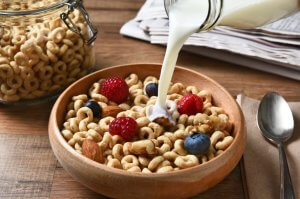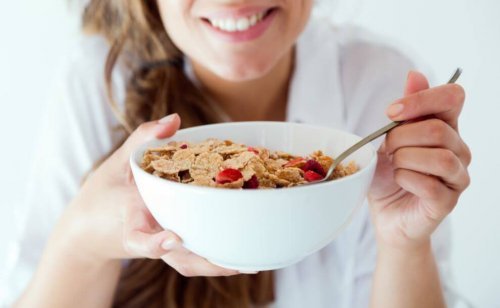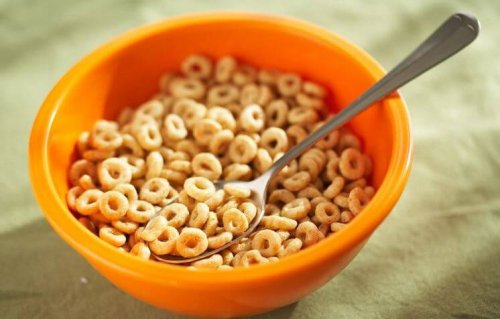Is it Healthy to Eat Cereal for Breakfast?

Whether we’re on a diet, performing intense workouts at the gym or we want to follow a healthier lifestyle, eating cereal for breakfast seems like a great option. It feels as if we’re enjoying a healthy, balanced diet.
But is having cereal for breakfast good for our health? Keep reading to find out!
Cereal for breakfast: a good or bad choice?
Firstly, it’s important to know the difference between “all-natural” cereals and ordinary cereals. The reason being is that they don’t have the same components. We’ll start by analyzing the cereal boxes that we see at the supermarket. They are packaged in colorful designs, mostly to get our children’s attention. Plus, they form different shapes and colors and become soft as soon as they’re in contact with milk or yogurt.

Ordinary breakfast cereals save us the time and trouble of cooking breakfast, especially for our children, before they go to school. Cereals are ideal for mothers who have a busy schedule. But the bad news is that they’re filled with sugar, flavorings and colorings. This is very different from what we are led to believe on the packaging.
And it’s not only that: these cereals are low in fiber and high in calories. We think we’re offering our family a nutritious and healthy breakfast, when in reality it’s the exact opposite.
What’s in the cereal that you’re eating?
If we look at the nutrition facts label , we realize that only a small percentage of our cereal is actually, “cereal” and the rest of the ingredients have strange names. This often happens with sugar, where it’s written as, dextrose, or corn syrup.
Other ingredients that we should pay attention to are preservatives, additives and food coloring. They can be addictive and are designed to make children love the taste. These components may cause allergies or food poisoning.
Grains used in cereals, may also be genetically modified, meaning that they were designed to grow at any time of the year. The big companies are now able to supply more food, making it (although it’s not always the case) lacking in nutrients.
The fiber cereals, designed for people who suffer with constipation or for people who want to lose weight, have a high dose of artificial sweeteners, such as sucralose. Even if they don’t contain sugar, sweeteners can be harmful to your health.
And lastly, did you know that cereals also contain salt? That’s right! Even if they’re sweet, sodium is present in large quantities to keep them fresh for longer.
How to choose a healthy cereal for breakfast?
It’s very important to know how to read the labels of the products that we’re buying.
As a general rule, you might consider a product to be unhealthy, if it has more than five unknown, or hard-to-pronounce ingredients.

Take your time to analyze the information given to you by the manufacturers and don’t be deceived. It may appear to be the healthiest cereal available, but read the labels carefully and be aware that not everything is what it may seem. That’s when you must decide whether to buy them or not.
Moreover, you can find healthier alternatives in the supermarket’s diet foods section. Oatmeal or cereals without food coloring or added sugar are always the best choice.
At the beginning, making the change might be difficult, especially for children, because their taste buds quickly become used to potent flavors. However, always keep in mind that it’s an investment in their health, as well as in yours.
Whether we’re on a diet, performing intense workouts at the gym or we want to follow a healthier lifestyle, eating cereal for breakfast seems like a great option. It feels as if we’re enjoying a healthy, balanced diet.
But is having cereal for breakfast good for our health? Keep reading to find out!
Cereal for breakfast: a good or bad choice?
Firstly, it’s important to know the difference between “all-natural” cereals and ordinary cereals. The reason being is that they don’t have the same components. We’ll start by analyzing the cereal boxes that we see at the supermarket. They are packaged in colorful designs, mostly to get our children’s attention. Plus, they form different shapes and colors and become soft as soon as they’re in contact with milk or yogurt.

Ordinary breakfast cereals save us the time and trouble of cooking breakfast, especially for our children, before they go to school. Cereals are ideal for mothers who have a busy schedule. But the bad news is that they’re filled with sugar, flavorings and colorings. This is very different from what we are led to believe on the packaging.
And it’s not only that: these cereals are low in fiber and high in calories. We think we’re offering our family a nutritious and healthy breakfast, when in reality it’s the exact opposite.
What’s in the cereal that you’re eating?
If we look at the nutrition facts label , we realize that only a small percentage of our cereal is actually, “cereal” and the rest of the ingredients have strange names. This often happens with sugar, where it’s written as, dextrose, or corn syrup.
Other ingredients that we should pay attention to are preservatives, additives and food coloring. They can be addictive and are designed to make children love the taste. These components may cause allergies or food poisoning.
Grains used in cereals, may also be genetically modified, meaning that they were designed to grow at any time of the year. The big companies are now able to supply more food, making it (although it’s not always the case) lacking in nutrients.
The fiber cereals, designed for people who suffer with constipation or for people who want to lose weight, have a high dose of artificial sweeteners, such as sucralose. Even if they don’t contain sugar, sweeteners can be harmful to your health.
And lastly, did you know that cereals also contain salt? That’s right! Even if they’re sweet, sodium is present in large quantities to keep them fresh for longer.
How to choose a healthy cereal for breakfast?
It’s very important to know how to read the labels of the products that we’re buying.
As a general rule, you might consider a product to be unhealthy, if it has more than five unknown, or hard-to-pronounce ingredients.

Take your time to analyze the information given to you by the manufacturers and don’t be deceived. It may appear to be the healthiest cereal available, but read the labels carefully and be aware that not everything is what it may seem. That’s when you must decide whether to buy them or not.
Moreover, you can find healthier alternatives in the supermarket’s diet foods section. Oatmeal or cereals without food coloring or added sugar are always the best choice.
At the beginning, making the change might be difficult, especially for children, because their taste buds quickly become used to potent flavors. However, always keep in mind that it’s an investment in their health, as well as in yours.
This text is provided for informational purposes only and does not replace consultation with a professional. If in doubt, consult your specialist.








